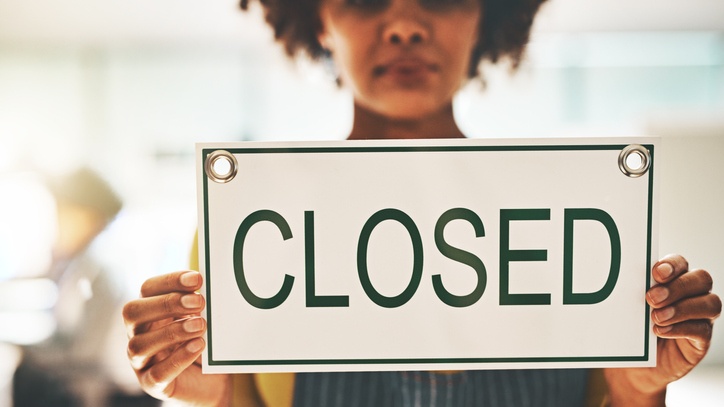The coronavirus has taken a toll on folks around the globe, but Black business owners in the U.S. may especially feel the impact.
According to NJ Advance Media, a study from The Brookings Institute shows a history of "economic shocks" such as the coronavirus having a major financial impact on the Black community. After the Great Recession more than 10 years ago, only 49% of Black-owned businesses survived the following years, compared to 60% of white-owned businesses that were able to stay afloat during the stretch, the study revealed.
White families have 10 times the amount of wealth as the average Black family, making it more difficult for Black businesses to withstand economic shocks, Brookings explained. Minority-owned businesses generally receive higher ratings on Yelp but still bring in less revenue compared to businesses in white-majority neighborhoods, according to the report. Additionally, the Stanford Institute for Economic Policy Research found that 7% of white-owned businesses secured loans in their first year, whereas only 1% of Black businesses did.
Due to negative perceptions of Black neighborhoods, businesses in Black-majority neighborhoods lost $4 billion in revenue last year, according to Brookings. Now, Black-owned businesses face an even bigger uphill climb because of the outbreak.
Tonnie Rozier, a Black bakery owner in New Jersey, talked about the difficulties he is facing during the pandemic.
“For me it’s very catastrophic,” Rozier told NJ Advance Media. “I do whatever I can whenever I can. When someone calls me with an order, I fill it. We’re no longer making deliveries because of that fear.”
Source of Knowledge, a Black-owned bookstore in Newark, started a GoFundMe after being forced to close amid the pandemic.
"Without our customers weekly support by way of purchases we are unable to maintain our daily needs to keep up with our business debts. Your donations will make sure our doors stay open and our employees are able to eat and pay bills," the GoFundMe page stated. "These funds will be used immediately so that we don't fall any further behind on our bills as well as preparing for that day when we can safely serve our community."
Masani Barnwell, one of the bookstore's owners, said the business has flatlined because of expenses such as mortgage payments and credit card bills.
"The (GoFundMe page) is to bring us back so we won’t be depleted, and we won’t have to take (these books) off the shelf for good,” Barnwell told NJ Advance Media.
Patrice McKinney, the bookstore’s co-owner, said she knows many people who died from the coronavirus.
“Not one day has passed that I have not lost somebody that I know,” she said.
Dr. Camara Phyllis Jones said Black people are also suffering more than other races during the pandemic because of various factors.
"What's happening is Black folks are getting infected more because they are exposed more, and once infected they're dying more because they have their bodies — our bodies — have born the burden of chronic disinvestment (and) active neglect of the community," she told CNN. "When I look at it is because of structural racism, which puts us in the forward-facing jobs so that we are exposed and less valued and don't have the protection that we need."
Dr. Anthony Fauci detailed the extent of the devastation in an interview with The Breakfast Club.
“So many of the things that were founded in varying degrees of racism over decades and decades…has now, in fact, created sociological conditions that put African Americans in situations of economic, employment and living conditions that immediately puts them in a situation where it’s more difficult for them to even avoid infection,” Fauci said.
He added that the coronavirus could be an opportunity to shed light on the issues facing the Black community by showing the "difficulties that are disproportionately impacting a certain group of people through no fault of their own."
"When we get out of this, maybe it will be a way to shine a real spotlight on another deleterious effect of systemic racism and systemic neglect of a very important democratic group in our society," Fauci said. "Maybe there will be … something good to come from this to show that even in a disease like COVID, you wind up getting the short end of the stick."
The country's top health expert also shut down the notion that genetics have something to do with the issue.
"That's nonsense to say it's genetic," he said. "African Americans have a higher degree of hypertension, obesity, asthma. All of those kinds of things that are preconditions, that if you do get infected, you wind up having a worse outcome."
